Gadgets of 2025 are revolutionizing tech: explore AI-powered gadgets, wearable health gadgets, eco-friendly gadgets, and gaming gadgets.
“Top Gadgets of 2025”
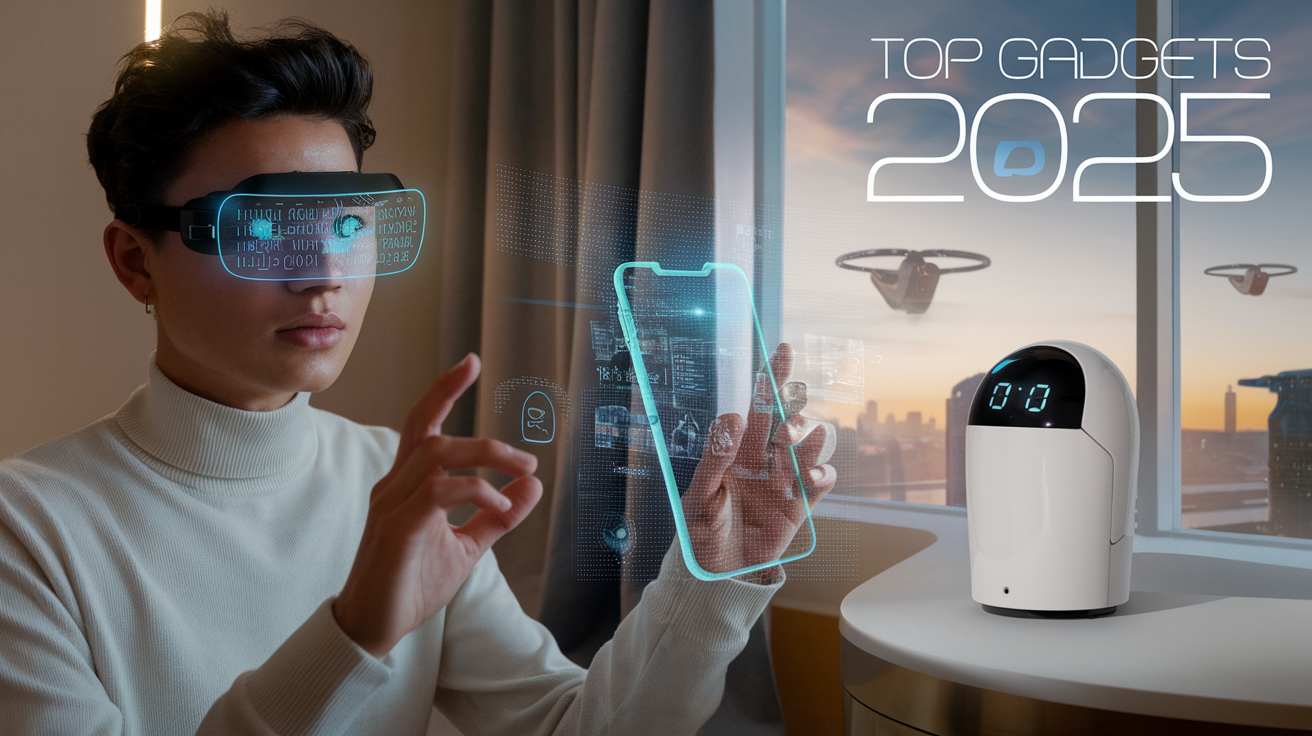
Imagine a world where your thoughts can be instantly transmitted to your loved ones, your home anticipates your every need, and your watch is your personal doctor. 🌟 Sounds like science fiction? Think again! The year 2025 is just around the corner, and it’s bringing with it a wave of groundbreaking gadgets that will transform our lives in ways we never thought possible.
These gadgets will redefine convenience and create new possibilities in our daily lives.
Moreover, the gadgets of 2025 promise to enhance our experiences in ways that align with our evolving lifestyles.
Join us as we discover gadgets that will not only enhance our lives but also redefine how we perceive technology.
These gadgets are designed to fit seamlessly into our routines, making life simpler and more enjoyable.
From revolutionizing how we communicate to reimagining our homes, health, and entertainment, the gadgets of 2025 are set to blur the lines between reality and the futuristic worlds we’ve only seen in movies. 🚀 But that’s not all – these innovations are also tackling some of our most pressing challenges, from environmental concerns to productivity hurdles and security threats.
With gadgets like these, communication will become more natural and engaging.
Are you ready to take a peek into the future? Join us as we explore the Top Gadgets of 2025 that will shape our world, enhance our daily lives, and perhaps even challenge our understanding of what’s possible. We’ll dive into seven key areas where these cutting-edge technologies are making their mark:
Moreover, the integration of AI into these gadgets will enhance functionality and user experience.
Revolutionizing Communication

Holographic Smartphones
“7 Exciting AI Tools Empowering Developers Today!”
Holographic smartphones are set to redefine our communication experience in 2025. These devices will project 3D images and videos into the air, allowing users to interact with virtual objects and people as if they were physically present. The technology behind these gadgets combines advanced optics, AI, and miniaturized projectors to create stunning holographic displays.
Key features of holographic smartphones:
- 360-degree viewable holograms
- Gesture-based interaction
- Realistic 3D video calls
- Holographic gaming experiences
- Compact and portable design
| Feature | Benefit |
|---|---|
| 3D Holographic Display | Immersive viewing experience |
| Gesture Control | Intuitive interaction without touching the device |
| AI-powered Hologram Generation | Real-time creation of lifelike holograms |
| Spatial Audio | Enhanced sound experience matching holographic visuals |
Brain-Computer Interfaces
These gadgets will open new avenues for interaction, making technology more accessible to everyone.
Brain-Computer Interfaces (BCIs) are poised to revolutionize how we interact with our devices. These cutting-edge gadgets will allow users to control their smartphones, computers, and other devices using only their thoughts. By interpreting neural signals, BCIs will enable seamless communication between the human brain and digital devices.
Applications of BCIs in communication:
- Thought-to-text messaging
- Direct brain-to-brain communication
- Controlling smart home devices with thoughts
- Enhanced accessibility for individuals with physical disabilities
Universal Language Translators
Universal Language Translators will break down language barriers, enabling seamless communication across different cultures. These advanced devices will utilize AI and machine learning algorithms to provide real-time, accurate translations of both spoken and written languages.
Features of Universal Language Translators:
- Real-time spoken language translation
- Instant text translation
- Cultural context adaptation
- Offline translation capabilities
- Integration with other communication devices
Gadgets are evolving to meet the user’s needs, ensuring seamless communication across cultures.
Augmented Reality Contact Lenses
Augmented Reality (AR) Contact Lenses will take personal communication to a new level by overlaying digital information directly onto our field of vision. These ultra-thin, comfortable lenses will incorporate miniaturized displays, cameras, and wireless connectivity to provide a seamless AR experience.
Applications of AR Contact Lenses in communication:
- Virtual name tags and personal information display
- Real-time translation of foreign languages in your field of view
- Enhanced video calls with shared AR environments
- Social media integration and notifications
| Feature | Application |
|---|---|
| Micro-LED Display | Overlay digital information on real-world view |
| Eye-tracking Sensors | Control AR interface with eye movements |
| Wireless Connectivity | Sync with smartphones and other devices |
| Biometric Sensors | Monitor eye health and adjust display accordingly |
As we explore these groundbreaking communication gadgets, it’s clear that the future of personal interaction is set to become more immersive, intuitive, and boundary-breaking than ever before. These innovations will not only change how we communicate but also how we perceive and interact with the world around us. With holographic smartphones, brain-computer interfaces, universal language translators, and AR contact lenses, the barriers of distance, language, and physical limitations will continue to dissolve, paving the way for a more connected global community. Now that we’ve explored these revolutionary communication devices, let’s turn our attention to the exciting developments in smart home innovations that will complement and enhance our daily lives.
These gadgets promise to elevate our everyday experiences in various contexts.
Smart Home Innovations
In this future, gadgets will play a crucial role in bridging communication gaps.
Gadgets will play a pivotal role in improving our quality of life and well-being.
Imagine the possibilities as these gadgets enhance our everyday interactions.
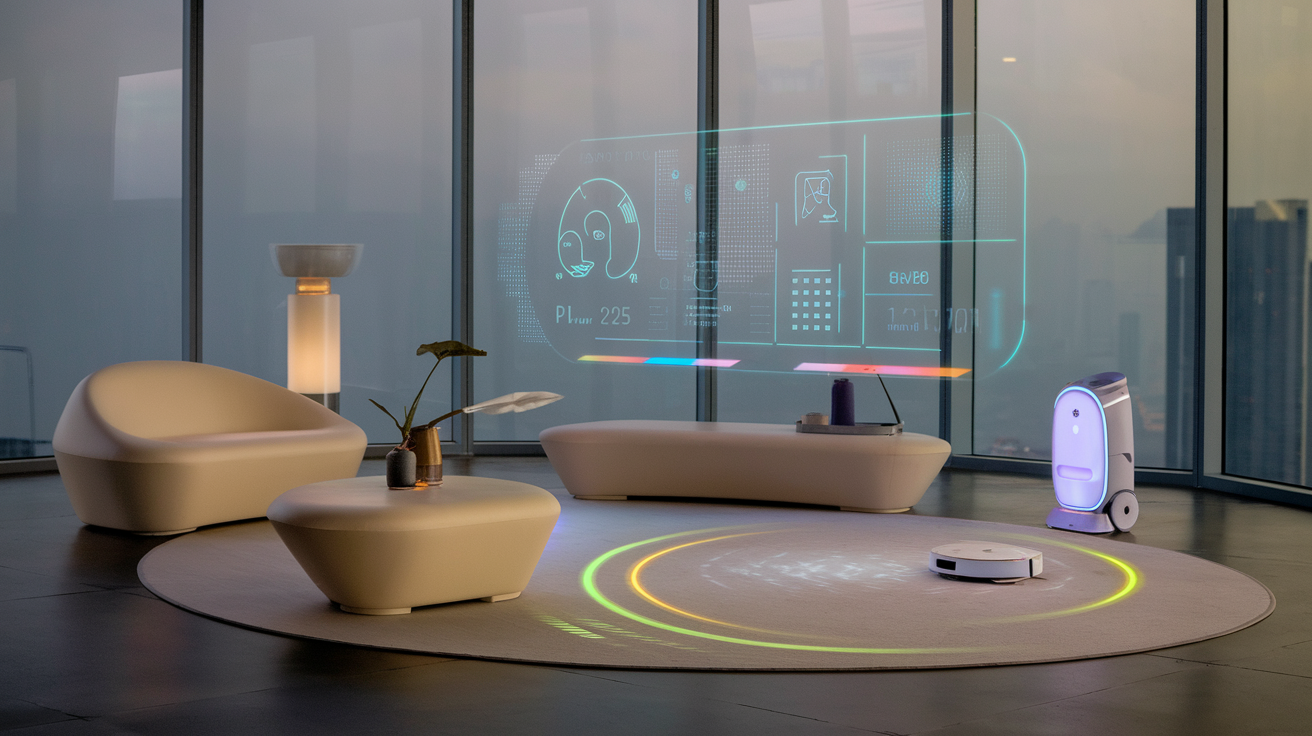
AI-Powered Home Assistants
As we explore the future of smart homes, AI-powered home assistants are set to revolutionize our daily lives. These advanced systems will go beyond simple voice commands, offering personalized experiences and seamless integration with various smart devices.
Key features of AI-powered home assistants in 2025:
- Natural language processing
- Emotional intelligence
- Predictive behavior analysis
- Multi-modal interaction (voice, gesture, facial recognition)
- Seamless device integration
| Feature | Benefits |
|---|---|
| Natural language processing | More intuitive and human-like conversations |
| Emotional intelligence | Ability to understand and respond to user emotions |
| Predictive behavior analysis | Anticipate user needs and automate tasks |
| Multi-modal interaction | Enhanced accessibility and user experience |
| Seamless device integration | Effortless control of all smart home devices |
These AI assistants will learn from your daily routines, preferences, and habits to create a truly personalized living environment. They’ll anticipate your needs, adjust lighting and temperature, and even suggest recipes based on your dietary preferences and available ingredients.
Self-Maintaining Appliances
Each gadget will serve as a gateway to new interactions and experiences.
The future of smart homes will also feature self-maintaining appliances that drastically reduce the need for human intervention. These intelligent devices will monitor their own performance, diagnose issues, and even perform basic maintenance tasks autonomously.
We are on the brink of a new era driven by innovative gadgets that adapt to our needs.
Some examples of self-maintaining appliances:
These gadgets will allow us to live smarter and connect better.
- Self-cleaning refrigerators that use UV light to eliminate bacteria
- Washing machines that detect and remove lint buildup
- Ovens that automatically calibrate temperature and clean themselves
- HVAC systems that optimize airflow and filter replacement
These appliances will not only save time and effort but also extend their lifespan through proactive maintenance. They’ll communicate with each other and with the central AI assistant to coordinate tasks and optimize energy usage.
Energy-Harvesting Furniture
In 2025, smart homes will take a significant leap towards sustainability with energy-harvesting furniture. These innovative pieces will capture and convert ambient energy from various sources to power themselves and other devices in the home.
Types of energy-harvesting furniture:
- Kinetic energy chairs and tables
- Solar-powered window blinds
- Thermoelectric floor tiles
- Piezoelectric bed frames
| Furniture Type | Energy Source | Potential Applications |
|---|---|---|
| Kinetic chairs | Movement | Charging small devices |
| Solar blinds | Sunlight | Powering lights and sensors |
| Thermoelectric tiles | Temperature differences | Heating and cooling systems |
| Piezoelectric beds | Pressure and vibration | Powering sleep tracking devices |
These energy-harvesting furniture pieces will work in tandem with the home’s central power management system to reduce reliance on the grid and lower energy bills. They’ll seamlessly blend into your home’s decor while contributing to a more sustainable lifestyle.
As we move towards more advanced entertainment and gaming gadgets, these smart home innovations will lay the foundation for a truly interconnected and efficient living space.
Through these gadgets, our homes will become smarter, catering to our lifestyles.
Wearable Health Tech
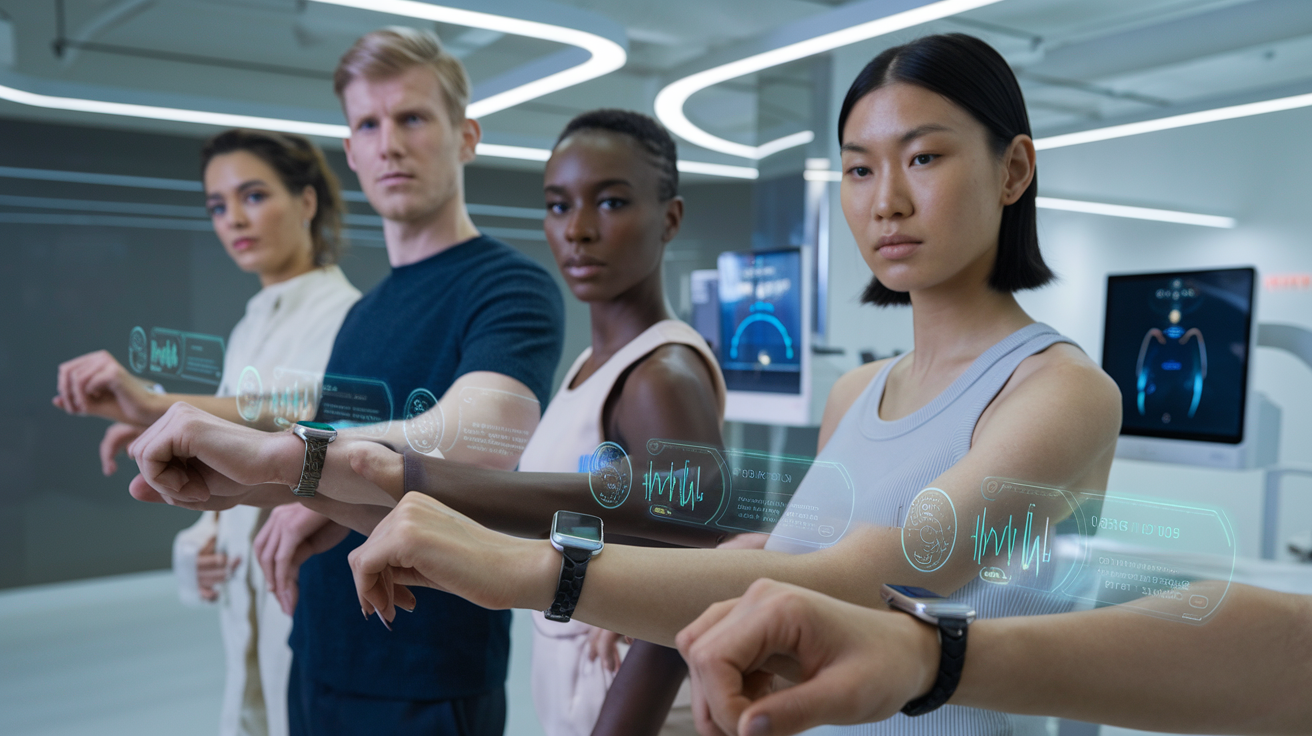
Nano-Biosensors for Real-Time Health Monitoring
Wearable health technology is set to reach new heights in 2025, with nano-biosensors leading the charge. These microscopic marvels will revolutionize how we monitor our health, providing continuous, real-time data on various bodily functions.
Nano-biosensors are tiny devices that can be integrated into everyday items like watches, clothing, or even temporary tattoos. They work by detecting specific biological markers in sweat, saliva, or interstitial fluid, offering insights into:
The convergence of health and technology through gadgets will pave the way for advancements.
- Blood glucose levels
- Hydration status
- Stress hormones
- Inflammation markers
- Nutrient deficiencies
Here’s a comparison of current wearable health tech and future nano-biosensors:
| Feature | Current Wearables | Nano-Biosensors 2025 |
|---|---|---|
| Size | Visible devices | Microscopic, virtually invisible |
| Data Collection | Periodic measurements | Continuous, real-time monitoring |
| Accuracy | Good, but limited | Highly precise, lab-grade results |
| Versatility | Single or few parameters | Multiple health markers simultaneously |
| User Experience | May require active input | Passive, seamless monitoring |
Personalized Medicine Dispensers
Building on the data collected by nano-biosensors, personalized medicine dispensers will emerge as game-changers in health management. These smart devices will:
- Analyze real-time health data
- Consult AI-powered health algorithms
- Dispense precise dosages of medication
- Adjust treatments based on individual responses
This technology promises to optimize medication efficacy while minimizing side effects, tailoring treatments to each user’s unique physiology.
Mood-Enhancing Wearables
In 2025, wearable health tech will extend beyond physical well-being to address mental health. Mood-enhancing wearables will use a combination of:
- Biofeedback sensors
- Light therapy
- Subtle vibrations
- Personalized audio cues
These devices will detect signs of stress, anxiety, or depression and provide immediate interventions to improve emotional well-being. They’ll work in tandem with professional mental health support, offering real-time coping strategies and tracking long-term progress.
Exoskeletons for Mobility Assistance
As technology continues to evolve, so will our expectations of gadgets.
Exoskeletons will transition from industrial and military applications to everyday use, particularly for individuals with mobility challenges. These wearable robotic frameworks will:
- Enhance strength and endurance
- Improve balance and coordination
- Assist in rehabilitation exercises
- Enable greater independence for users
From helping the elderly maintain an active lifestyle to supporting individuals with disabilities, exoskeletons will redefine mobility assistance in 2025.
Smart Clothing with Adaptive Temperature Control
The fusion of textiles and technology will reach new heights with smart clothing featuring adaptive temperature control. These garments will:
- Sense body temperature and environmental conditions
- Adjust insulation and breathability in real-time
- Integrate heating and cooling elements seamlessly
- Optimize comfort in various climates and activities
Whether you’re hiking in unpredictable weather or working in a temperature-variable environment, these smart clothes will ensure you’re always at your optimal comfort level.
As we look towards the future of wearable health tech, it’s clear that these innovations will not only monitor our health but actively contribute to our overall well-being. The integration of these technologies into our daily lives promises a future where proactive health management becomes effortless and personalized.
Entertainment and Gaming Gadgets
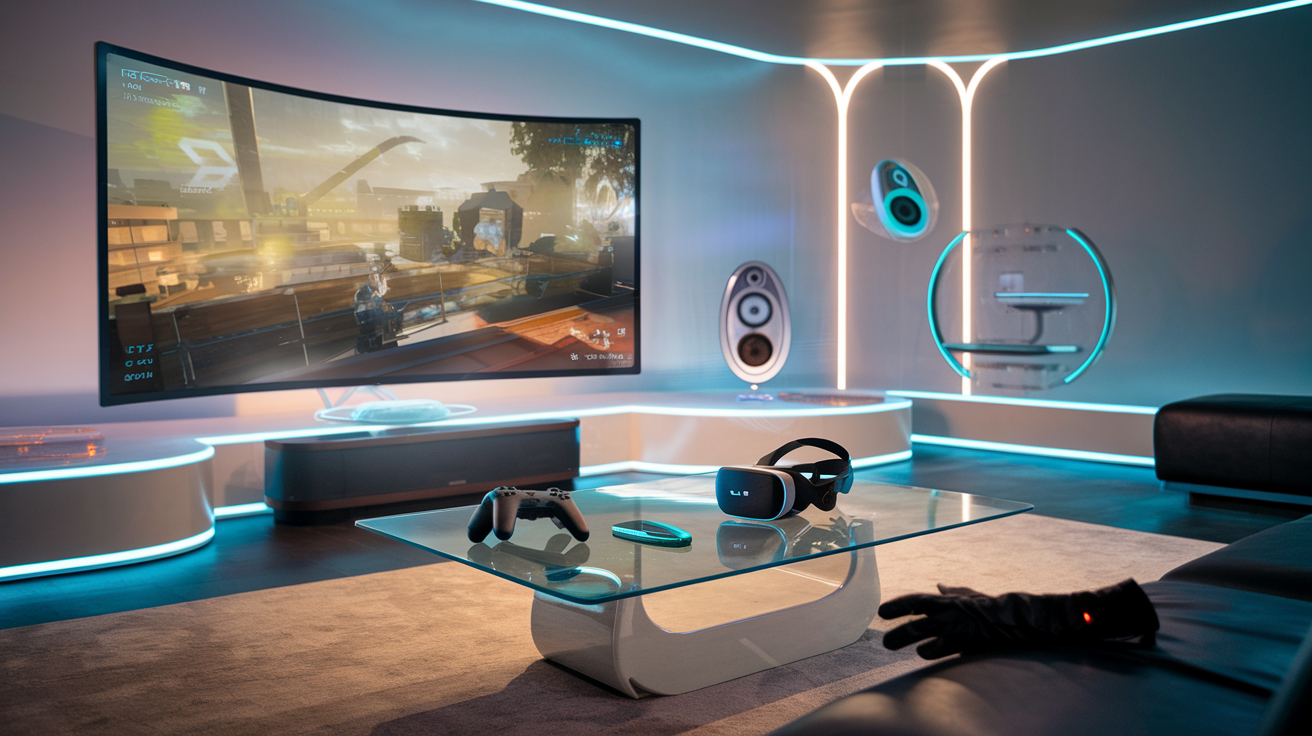
8K Foldable Displays
As we delve into the realm of entertainment and gaming gadgets, one of the most exciting innovations on the horizon is the 8K foldable display. These cutting-edge screens are set to revolutionize how we consume media and interact with our devices.
8K foldable displays offer an unprecedented level of visual fidelity, boasting a resolution of 7680 x 4320 pixels. This quadruples the pixel count of 4K displays, resulting in incredibly sharp and lifelike images. The foldable aspect adds a new dimension of versatility, allowing users to seamlessly switch between compact and expansive viewing experiences.
Key features of 8K foldable displays include:
- Ultra-high resolution for unparalleled clarity
- Flexible OLED technology for durability and vibrant colors
- Variable screen sizes to suit different use cases
- Improved energy efficiency compared to traditional displays
The potential applications for these displays are vast, ranging from immersive gaming experiences to portable cinema-quality viewing. Imagine unfolding your smartphone into a tablet-sized screen for an impromptu gaming session or movie night.
Neural Gaming Interfaces
Taking gaming to the next level, neural interfaces promise to create a direct link between the human brain and gaming systems. This technology aims to translate thoughts and intentions into in-game actions, offering an unprecedented level of immersion and control.
These gadgets will enhance safety, comfort, and efficiency in our living spaces.
Neural gaming interfaces work by interpreting brain signals through non-invasive sensors, typically worn as a headset. These signals are then processed and translated into game commands in real-time, allowing for faster and more intuitive gameplay.
| Feature | Benefit |
|---|---|
| Thought-based control | Eliminates the need for physical controllers |
| Reduced input lag | Faster response times in competitive gaming |
| Adaptive difficulty | Games adjust based on player’s mental state |
| Enhanced accessibility | Enables gaming for those with physical limitations |
While still in early stages, neural gaming interfaces have the potential to revolutionize not just gaming, but also virtual reality experiences and even therapeutic applications.
Imagine living in a home fully equipped with gadgets designed for optimal convenience.
Immersive Haptic Feedback Systems
Complementing visual and neural interfaces, advanced haptic feedback systems are set to add a new dimension of tactile sensation to our digital experiences. These systems go beyond simple vibrations, offering a range of sensations that can simulate texture, pressure, and even temperature.
Immersive haptic feedback is achieved through a combination of technologies:
- Microfluidic systems that can create localized pressure and texture
- Ultrasonic transducers for mid-air haptic effects
- Thermal elements for temperature simulation
- Electrotactile stimulation for precise sensory feedback
These systems can be integrated into various form factors, from full-body suits for VR gaming to more subtle wearables for everyday use. The applications extend beyond gaming, potentially revolutionizing fields such as remote surgery, virtual training, and even long-distance communication.
As we look towards the future of entertainment and gaming gadgets, it’s clear that the lines between the digital and physical worlds are blurring. With 8K foldable displays offering visual brilliance, neural interfaces providing intuitive control, and haptic systems adding tactile depth, the gaming experiences of 2025 promise to be more immersive and engaging than ever before. These technologies not only enhance entertainment but also open up new possibilities for education, training, and social interaction in the digital age.
Eco-Friendly Transportation Devices
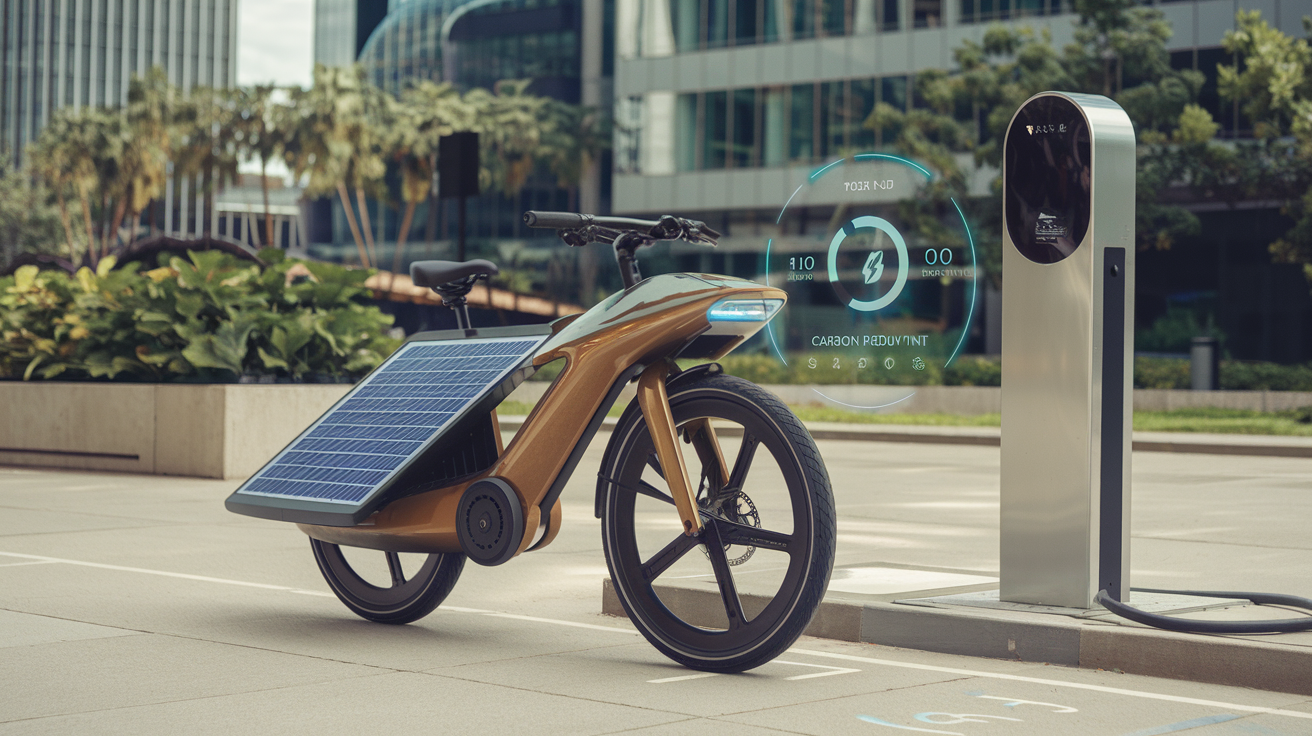
Personal Flying Vehicles
As we look towards the future of eco-friendly transportation, personal flying vehicles are set to revolutionize the way we travel. These compact aircraft promise to alleviate traffic congestion and reduce carbon emissions in urban areas. Here’s a breakdown of the key features:
- Vertical takeoff and landing (VTOL) capabilities
- Electric propulsion systems for zero emissions
- Advanced AI-driven navigation and collision avoidance
- Compact design for easy storage and parking
- Noise reduction technology for urban integration
Hyperloop Pods
Hyperloop technology is poised to transform long-distance travel with its high-speed, low-energy transportation system. These pods will offer an eco-friendly alternative to traditional modes of transport:
| Feature | Benefit |
|---|---|
| Magnetic levitation | Reduces friction and energy consumption |
| Vacuum tubes | Minimizes air resistance for higher speeds |
| Solar-powered infrastructure | Sustainable energy source |
| High-speed travel | Drastically reduced travel times |
| Low environmental impact | Minimal land use and emissions |
Self-Driving Electric Bicycles
The fusion of electric propulsion and autonomous technology brings us self-driving electric bicycles. These innovative vehicles offer a perfect blend of convenience and sustainability for urban commuters:
- Intelligent route planning and traffic navigation
- Automated balancing and obstacle avoidance
- Foldable designs for easy storage and portability
- Integration with smart city infrastructure
- Regenerative braking to extend battery life
Hydrogen-Powered Scooters
Hydrogen fuel cell technology is making its way into personal transportation with hydrogen-powered scooters. These eco-friendly vehicles offer several advantages over traditional electric scooters:
- Longer range due to higher energy density of hydrogen
- Faster refueling times compared to battery charging
- Zero emissions, producing only water as a byproduct
- Potential for locally produced, renewable hydrogen fuel
- Reduced dependency on scarce battery materials
The adoption of these eco-friendly transportation devices will significantly contribute to reducing our carbon footprint. As cities become smarter and more connected, these innovative modes of transport will seamlessly integrate with existing infrastructure, offering efficient and sustainable mobility solutions for urban dwellers.
With advancements in materials science and energy storage technologies, we can expect these eco-friendly transportation devices to become more affordable and accessible to the general public. This shift towards sustainable mobility will not only benefit the environment but also improve the quality of life in urban areas by reducing noise pollution and traffic congestion.
As we move towards a greener future, these eco-friendly transportation devices will play a crucial role in shaping our cities and how we move within them. Next, we’ll explore how technology is enhancing our productivity and efficiency in both personal and professional spheres.
Entertainment gadgets are evolving, bringing immersive experiences to the forefront.
These gadgets will redefine how we consume media and interact with entertainment.
Productivity Boosters
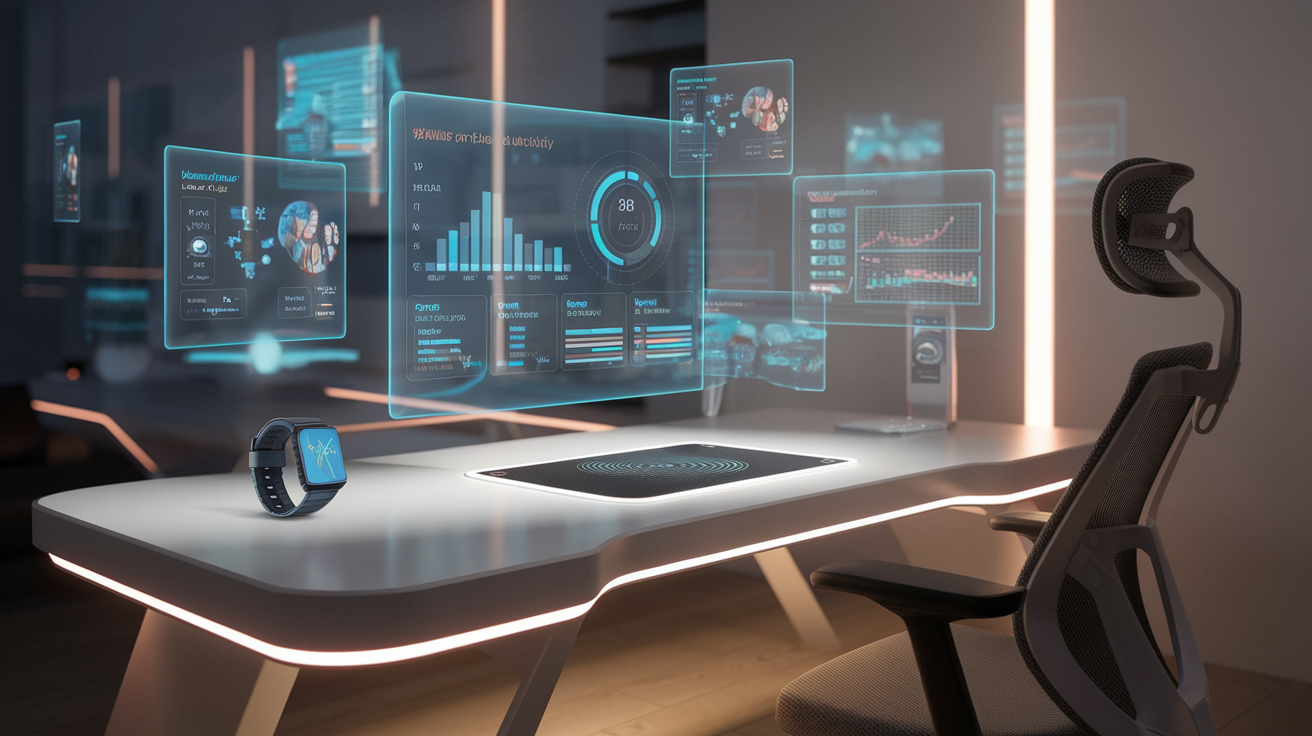
Thought-to-Text Transcribers
In the realm of productivity, thought-to-text transcribers are set to revolutionize how we capture and process ideas. These cutting-edge devices use advanced neural interfaces to translate our thoughts directly into written text, eliminating the need for traditional typing or voice dictation.
- Increased efficiency: Capture ideas at the speed of thought
- Reduced cognitive load: Focus on ideation without worrying about documentation
- Enhanced accessibility: Benefit users with physical limitations in typing or speaking
| Feature | Benefit |
|---|---|
| Neural interface | Direct thought-to-text conversion |
| AI-powered language processing | Accurate transcription and formatting |
| Multi-language support | Seamless translation of thoughts |
| Cloud integration | Instant syncing across devices |
Holographic Workstations
With advanced gadgets, our viewing experiences will become more engaging and interactive.
Holographic workstations are transforming the concept of a traditional desk setup. These futuristic devices project fully interactive, three-dimensional displays that can be manipulated with hand gestures or eye movements.
- Increased workspace: Multiple virtual screens without physical constraints
- Enhanced collaboration: Shared holographic environments for remote teams
- Improved ergonomics: Customizable layouts to reduce physical strain
AI Personal Assistants
AI personal assistants in 2025 go beyond simple task management. These sophisticated AI entities serve as true cognitive partners, anticipating needs and providing valuable insights to boost productivity.
Key capabilities:
- Contextual task prioritization
- Adaptive scheduling based on energy levels and work patterns
- Real-time language translation for global communication
- Emotional intelligence for personalized motivation and support
Memory Enhancement Devices
Memory enhancement devices represent a significant leap in cognitive augmentation. These wearable gadgets use non-invasive neurostimulation techniques to improve memory formation, retention, and recall.
- Improved learning: Accelerated acquisition of new skills and knowledge
- Enhanced recall: Quick access to stored information and experiences
- Cognitive protection: Potential to mitigate age-related memory decline
| Feature | Application |
|---|---|
| Targeted neurostimulation | Boost memory formation during study sessions |
| Sleep optimization | Enhance memory consolidation during rest |
| Cognitive exercises | Personalized brain training routines |
| Neuroplasticity tracking | Monitor and optimize cognitive improvements |
With these advanced productivity boosters, professionals in 2025 will have unprecedented tools to enhance their cognitive abilities and streamline their work processes. As we continue to push the boundaries of human-machine interaction, the line between our natural capabilities and technological augmentation becomes increasingly blurred. Next, we’ll explore how these advancements in productivity tech intersect with the critical realm of personal and data security in our digital age.
Next-Gen Security Solutions
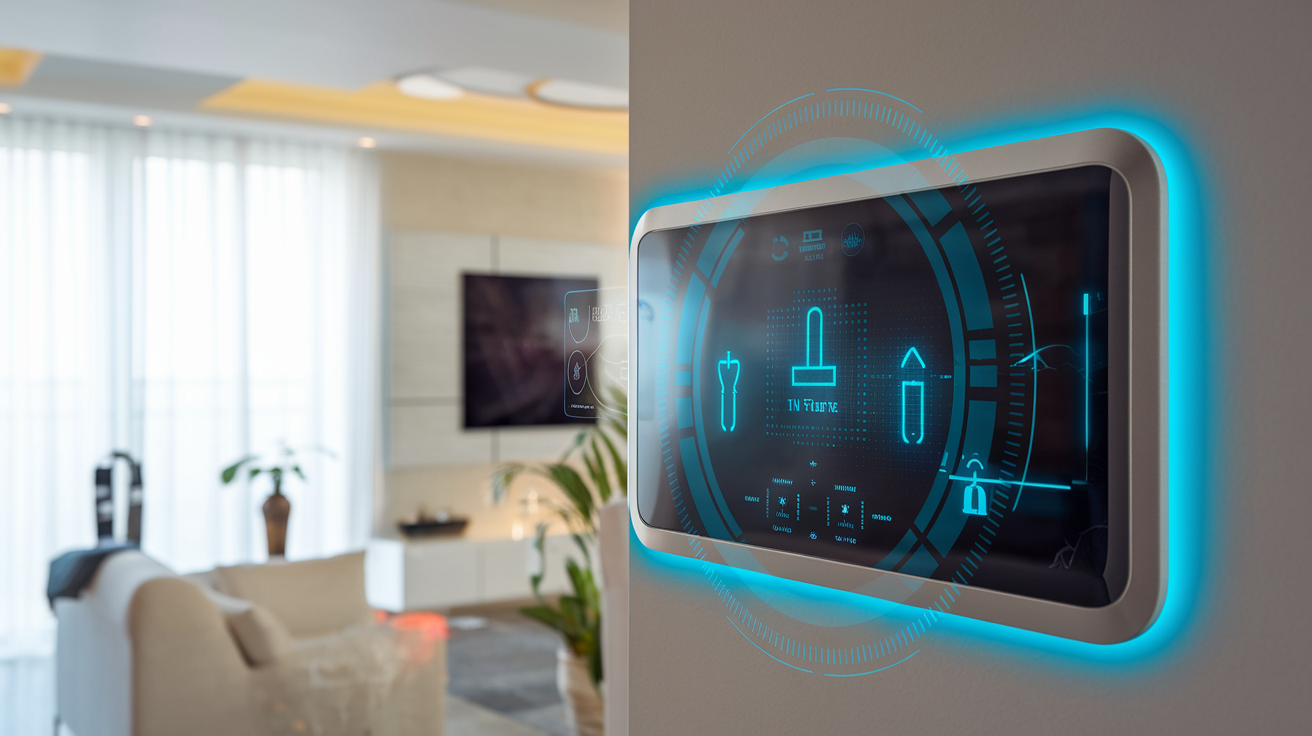
Gadgets that blend reality with fantasy promise a new frontier in entertainment.
Quantum Encryption Devices
As we delve into the realm of next-generation security solutions, quantum encryption devices stand at the forefront of technological innovation. These cutting-edge gadgets harness the principles of quantum mechanics to provide unparalleled data protection.
Quantum encryption devices utilize the unique properties of quantum states to generate truly random encryption keys. Unlike traditional encryption methods, which rely on complex mathematical algorithms, quantum encryption is theoretically unbreakable. This makes it an invaluable tool for safeguarding sensitive information in an increasingly connected world.
Here’s a comparison of quantum encryption vs. traditional encryption:
| Feature | Quantum Encryption | Traditional Encryption |
|---|---|---|
| Key Generation | Based on quantum states | Based on algorithms |
| Security Level | Theoretically unbreakable | Potentially vulnerable to advanced computing |
| Speed | Ultra-fast key distribution | Slower key exchange |
| Future-proofing | Resistant to quantum computing attacks | Potentially vulnerable to quantum computing |
Biometric Authentication Implants
As we engage with these gadgets, our entertainment options will expand and diversify.
Moving beyond external devices, biometric authentication implants represent the next leap in personal security. These tiny, subcutaneous chips offer a seamless and highly secure method of identity verification.
Key features of biometric authentication implants include:
- Multi-factor authentication: Combines physiological data with implant-specific identifiers
- Continuous authentication: Provides ongoing verification without user intervention
- Tamper-proof design: Resistant to physical manipulation or duplication
- Integration with IoT devices: Enables secure interaction with smart home and workplace systems
As these implants become more sophisticated, they’re poised to replace traditional forms of identification, offering a level of security and convenience previously unimaginable.
AI-Powered Surveillance Drones
Rounding out our exploration of next-gen security solutions are AI-powered surveillance drones. These autonomous flying sentinels represent a significant advancement in perimeter security and threat detection.
AI-powered surveillance drones leverage machine learning algorithms to:
- Identify potential security threats in real-time
- Adapt to changing environments and situations
- Coordinate with other security systems for comprehensive coverage
- Minimize false alarms through advanced pattern recognition
The integration of AI with drone technology allows for 24/7 monitoring with minimal human intervention. These drones can cover large areas efficiently, accessing locations that might be challenging or dangerous for human security personnel.
As we look towards the future of security, it’s clear that the combination of quantum encryption, biometric implants, and AI-powered drones will form a formidable defense against evolving threats. These advanced home security systems not only protect our physical spaces but also safeguard our digital lives in ways we’re only beginning to imagine.

These gadgets will create compelling narratives, enhancing our connection to stories.
The future of technology is set to transform our daily lives in extraordinary ways. From revolutionary communication devices to smart home innovations, wearable health tech, and cutting-edge entertainment gadgets, the year 2025 promises an array of exciting advancements. Eco-friendly transportation solutions and productivity-enhancing tools will further streamline our routines, while next-generation security systems will keep us safer than ever before.
As we embrace these technological marvels, it’s crucial to stay informed and adaptable. The gadgets of 2025 will not only enhance our personal lives but also contribute to a more connected, efficient, and sustainable world. Keep an eye on these emerging technologies and prepare to integrate them into your lifestyle for a smarter, more convenient future.
- ⚡ 【Safe and reliable】 Easy to use USB-C rechargeable, Our tabletop cooling fan is USB-C rechargeable, so it can be used …
- ⚡ 【Multi-Function Cooling Fan】- This 2025 summer advanced tabletop cooling fan combines 3 functions as a powerful blower…
- ⚡ 【3 Levels of Air Flow / 3 Spray Volume】- The cooling fan can be adjusted manually, up and down to a wide range of air …
These gadgets will empower us to take charge of our health like never before.
As we embrace these gadgets, we can look forward to a healthier future.
As we adapt to these gadgets, our experiences will be more personalized and immersive.
With these gadgets, we’ll redefine how we perceive entertainment and leisure.
As we embrace gadgets, we can anticipate a future rich in creativity and connectivity.
Share this content:


